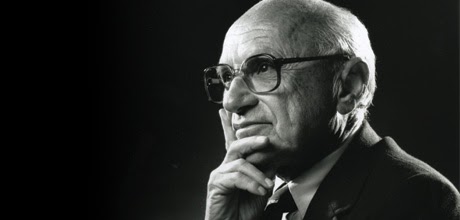If you know anything about free market economics you’ll have heard of Milton Friedman. To celebrate what would have been his 105th birthday, we’ve put together a summary of the great man and a few of his many contributions to the world.
 He coined the terms ‘money matters’ and ‘permanent income’, and taught the general public to question government policies and economic decisions. Born in 1912, Friedman was raised in New York City by his Jewish immigrant parents. He went to Rutgers University and got a Bachelor of Arts, gaining a Masters through the University of Chicago in 1933 and his PhD from Columbia University.
He coined the terms ‘money matters’ and ‘permanent income’, and taught the general public to question government policies and economic decisions. Born in 1912, Friedman was raised in New York City by his Jewish immigrant parents. He went to Rutgers University and got a Bachelor of Arts, gaining a Masters through the University of Chicago in 1933 and his PhD from Columbia University.
The young economist earn a bunch of awards before he was 40, such as the John Bates Clark Medal for outstanding achievement. In 1976 he was awarded the Nobel Prize in economics for “his achievements in the field of consumption analysis, monetary history and theory, and for his demonstration of the complexity of stabilization policy.” Friedman picked up both the National Medal of Science and Presidential Medal of Freedom in 1988.
Milton Friedman’s bibliography
He held some pretty important roles throughout his career, serving as president of the American Economic Association and advising President Richard Nixon. He wrote a number of pivotal texts including:
- Income from Independent Professional Practice (1945), coauthored with Simon Kuznets — the medical profession was put under the spotlight and it was argued that state licensing procedures limited entry into the medical profession. This meant that doctors could charge higher fees than they would be able to is competition was more open.
- Studies in the Quantity Theory of Money (1956) — the theory here was that increased monetary growth increases prices but has little or no effect on output.
- A Theory of the Consumption Function (1957) — the view of economist John Maynard Keynes was defied in this tome. Keynes believed people adjusted their household costs to meet their income but Friedman showed the opposite to be true — that budgets were set by how much people expected to earn, not by how much they actually earn. This is called ‘permanent income’, a measure of the average income people expect over a few years.
- Capitalism and Freedom (1962) — free markets hit the mainstream audience with this one. Friedman outlined the benefits of free market economics in regard to exchange rates, taxes, doctors and education.
- Monetary History of the United States, 1867–1960 (1963), coauthored with Anna Schwartz — he angered the Federal Reserve with this book by blaming their policies for the Great Depression. They responded by having a counter history written.
- Free to Choose (1980), coauthored with his wife, Rose Friedman — the best-selling nonfiction book of 1980, this one made him a household name. The book tied in with a PBS TV series.
Milton Friedman’s gift to us
Monetarism and price theory, explaining how individual markets determine prices, were Freidman’s greatest legacies. This all round great guy was a supporter of gay rights, legalisation of marijuana and economic freedom. Although he died in 2006, he worked up until his death and his work is still highly relevant today.

1 Comment
And for a great follow-up short video on Milton Friedman…try this…
https://www.youtube.com/watch?v=A_4U0TuF6WM&